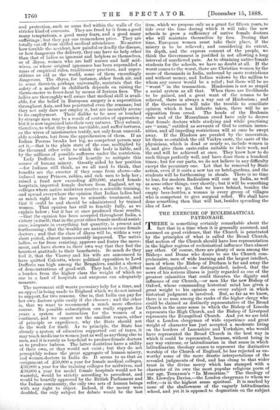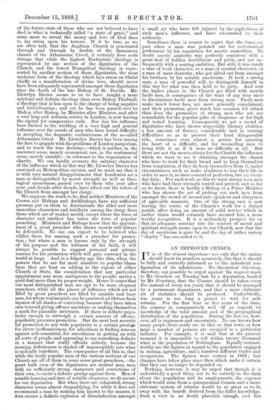THE EXERCISE OF ECCLESIASTICAL PATRONAGE. T HERE is something certainly remarkable
about the fact that in a time when it is generally assumed, and assumed on good evidence, that the Church is penetrated by the principles of what is called the Broad Church, that section of the Church should have less representation in the higher regions of ecclesiastical influence than almost any other. Of course, there are plenty of men among the Bishops and Deans who desire to see the Church com- prehensive, men of wide learning and the largest intellect, men of whom the Bishop of Durham is far and away the most distinguished,—so distinguished, indeed, that the news of his serious illness is justly regarded as one of the greatest calamities that could threaten the dignity and influence of our Church,—or men like the new Bishop of Oxford, whose commanding historical mind has given a great weight to his opinion on every subject in which historical judgment is involved. But, so far as we know, there is no man among the ranks of the higher clergy who could be claimed as distinctly representative of the Broad Church in the same sense in which the Bishop of Lincoln represents the High Church, and the Bishop of Liverpool represents the Evangelical Church. And yet we are told that a London clergyman of wide experience and great weight of character has just accepted a moderate living on the borders of Lancashire and Yorkshire, who would have represented the Broad Church in the best way in which it could be represented, because, without being in any way extreme, or latitudinarian in that sense in which latitudinarian theology ceases to represent the distinctive worship of the Church of England, he has rejected as un- worthy some of the more drastic interpretations of the revealed judgments of God, and has clung to that wider trust in the divine mercy which has stamped with a character of its own the most popular religious poem of our age, Tennyson's " In Memoriam." The theology of Mr. Llewelyn Davies,—the London clergyman to whom we refer,—is in the highest sense spiritual. It is marked by none of the shallowness of the vaguely latitudinarian school, and yet it is opposed to dogmatism on the subject of the future state of those who are not believed to have died in what is technically called " a state of grace," and cares more to reveal the mercy and love of God than to lay stress upon his terrors. If it be true, as we are often told, that the Anglican Church is penetrated through and through by doubts of the damnatory clauses of the Athanasian Creed, it certainly does seem strange that while the highest Eucharistic theology is represented by one section of the dignitaries of the Church, and the lowest Evangelical theology is repre- sented by another section of those dignitaries, the most moderate form of the theology which lays stress on Christ chiefly as a manifestation of divine love, should never have been adequately represented amongst those dignitaries since the death of the late Bishop of St. Davids. Mr. Llewelyn Davies seems to us to have taught a more spiritual and definite theology than even Bishop Thirlwall, a theology that is less open to the charge of being negative and latitudinarian ; and yet he has been passed over by Bishop after Bishop, by Minister after Minister, and after a very long and arduous service in London, is now leaving the capital for comparative exile. Nor has his influence been limited to the wielding of a very high and general influence over the creeds of men who have found difficulty in accepting the dogmatic exclusiveness of the so-called Athanasian Creed. Mr. Llewelyn Davies has been among the first to grapple with the problems of London pauperism, and to teach the true doctrine, which is neither, in the narrower sense, merely economical, nor, in the sentimental sense, merely amiable,—in reference to the organisation of charity. We can hardly overrate the salutary character of the influence which in this way Mr. Llewelyn Davies has exercised on Metropolitan opinion, and we must say that it is with very natural disappointment that Londoners see a man so distinguished by moral strength as well as theo- logical earnestness, passed over by those who year after year, and decade after decade, have sifted out the rulers of the Church from amongst her clergy. We suppose the truth to be, that neither Ministers of the Crown, nor Bishops and Archbishops, have any sufficient pressure put on them to discriminate the abler and more masculine characters and intellects among the clergy from those which are of weaker mould, except where the force of character and intellect has taken the form of popular preaching. Ministers and Bishops know that the appoint- ment of a great preacher who draws crowds will always be defensible. No one can expect to be believed who vilifies them for naming such a preacher for promo- tion ; but where a man is known only by the strength of his purpose and the loftiness of his faith, it will always be possible to suggest personal and private reasons for his promotion which will gain currency in the world at large. And in a fidgetty age like this, when the powers that be are far more sensitive to popular blame than they are bent on adding to the -vigour of either Church or State, the consideration that any particular appointment may seem ambiguous to the people, carries a good deal more than its proper weight. Hence it comes that our most distinguished men are apt to be mere eloquent preachers, while all the places of influence which are not filled by great preachers are filled by amiable and busy men, for whom testimonials can be procured ad libitum from laymen of all shades of conviction, because they have taken care to avoid giving offence anywhere or making themselves a mark for plausible strictures. If there is definite popu- larity enough to outweigh a certain amount of offence, popularity procures promotion. But the next best security for promotion to any wide popularity is a certain prestige for clever inoffensiveness, for adroitness in finding reasons against sell-committal, for smoothness in getting on with all sorts of people, and appearing to say something definite in a manner that really offends nobody, because the seeming definiteness is shaded off imperceptibly into what is radically indefinite. The consequence of all this is, that while the really popular men of the various sections of our Church are all of them in some sense great preachers,—the great bulk even of the dignitaries are neutral men, men with no sufficiently strong characters and convictions of their own, to excite a definite grudge against them. Men of notable learning and men of notable eloquence, we do secure for our dignitaries. But when these are exhausted, strong character seems almost disqualifying, for while it does not recommend a man by making him known to the masses, it does ensure a definite explosion of dissatisfaction amongst a small set who have felt injured by the explicitness of such men's influence, and have succumbed to their authority. Sometimes there is reason to regret that the times are past when a man was pointed out for ecclesiastical preferment by his reputation for ascetic austerities. No doubt ascetic austerity was perfectly consistent with a great deal of hidden worldliness and pride, and not un- frequently with a soaring ambition. But still, it was rarely a man of weak character, or a man of neutral character, or a man of mere dexterity, who got sifted out from amongst his brethren by his notable asceticism. It took a strong man, a man of powerful will, to distinguish himself in this way for what was then held to be piety. Aud now the higher places in the Church get filled with merely facile men, in consequence of the want of any true sieve to discriminate facile men from strong men. Facile men make much fewer foes, are more generally complaisant, and their promotion gives much less occasion for attack than does the promotion of strong men who are not remarkable for the popular gifts of eloquence or for high and tested learning. Consequently we get a crowd of dignitaries who have shown respectable literary abilities, a fair amount of fluency, considerable tact in turning difficulties so as to present their least disagreeable side, sometimes even almost a genius for ignoring the heart of a difficulty, and for reconciling men to living with it as if it were no difficulty at all. But these are not the men to obtain for the Church the influence which we want to see it obtaining amongst the classes who have to work for their bread and to keep themselves from temptation, if they do keep themselves from it, under circumstances such as make readiness to lose their life in order to save it, no mere counsel of perfection, but an every- day duty. For such work as this we want strong men, men who have had their strength tested and proved, and so far as we know, there is hardly a Bishop or a Prime Minister who has shown the art of picking out such men from amongst the crowd of second-rate speakers and clergymen of agreeable manners. One of the strong men is now leaving the centre of the Church's work for a distant parish, after doing an amount of solid service which in earlier times would certainly have secured him a more worthy recognition. It is a melancholy prospect for us that no adequate scrutiny into the sources of moral and spiritual strength seems open to our Church, now that the day of asceticism is gone by and the day of rather watery " charity " has succeeded to it.















































 Previous page
Previous page